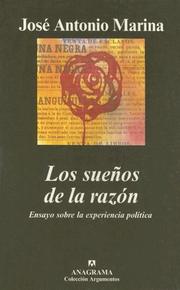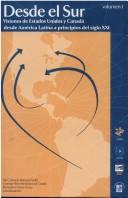| Listing 1 - 10 of 39 | << page >> |
Sort by
|

ISBN: 9684963076 9789684963078 Year: 1996 Publisher: México: Ciesas,
Abstract | Keywords | Export | Availability | Bookmark
 Loading...
Loading...Choose an application
- Reference Manager
- EndNote
- RefWorks (Direct export to RefWorks)
Book
ISBN: 9789878161938 9878161935 Year: 2020 Publisher: Buenos Aires : Prometeo Libros S. A.,
Abstract | Keywords | Export | Availability | Bookmark
 Loading...
Loading...Choose an application
- Reference Manager
- EndNote
- RefWorks (Direct export to RefWorks)
This book explores the complex relationship between cinema and the transition to democracy in several Latin American countries, focusing on Argentina, Bolivia, Brazil, Chile, and Uruguay. It examines how films from the late 20th century both reflect and influence political changes during the transition periods from dictatorship to democracy. The book challenges the notion of 'transition' as a clearly defined historical period and delves into the aesthetic and political significance of films produced during this time. Through a series of critical essays, the authors analyze the diverse cinematic responses to political shifts, the role of memory and narrative, and the generational dialogues between older militant cinema and new filmmakers. The book is aimed at scholars, students, and readers interested in film studies, Latin American history, and political transitions.
Democratization. --- Political culture. --- Democratization --- Political culture
Book
ISBN: 9683655181 9789683655189 Year: 1997 Publisher: Mexico: Jornada ediciones,
Abstract | Keywords | Export | Availability | Bookmark
 Loading...
Loading...Choose an application
- Reference Manager
- EndNote
- RefWorks (Direct export to RefWorks)

ISBN: 8433962019 Year: 2003 Publisher: Barcelona : Editorial Anagrama,
Abstract | Keywords | Export | Availability | Bookmark
 Loading...
Loading...Choose an application
- Reference Manager
- EndNote
- RefWorks (Direct export to RefWorks)
Political culture. --- France --- History
Book
ISBN: 8497182634 Year: 2004 Publisher: Valladolid : Junta de Castilla y León. Consejería de cultura y turismo,
Abstract | Keywords | Export | Availability | Bookmark
 Loading...
Loading...Choose an application
- Reference Manager
- EndNote
- RefWorks (Direct export to RefWorks)
Book
ISBN: 6076283033 9786076283035 Year: 2018 Publisher: Ciudad de México, México : El Colegio de México,
Abstract | Keywords | Export | Availability | Bookmark
 Loading...
Loading...Choose an application
- Reference Manager
- EndNote
- RefWorks (Direct export to RefWorks)

ISBN: 9683695078 9789683695079 Year: 2003 Publisher: Mexico: Universidad Nacional Autónoma de México. Centro de Investigaciones sobre América del Norte. Facultad Latinoamericana de Ciencias Sociales, Sede México,
Abstract | Keywords | Export | Availability | Bookmark
 Loading...
Loading...Choose an application
- Reference Manager
- EndNote
- RefWorks (Direct export to RefWorks)
Political culture --- United States --- Canada
Book

ISBN: 9791036503597 956841651X Year: 2018 Publisher: Santiago : Ariadna Ediciones,
Abstract | Keywords | Export | Availability | Bookmark
 Loading...
Loading...Choose an application
- Reference Manager
- EndNote
- RefWorks (Direct export to RefWorks)
One of the most interesting and distinctive notes of this book refers to its relevance with the time when writing against the consolidation of the extractivist accumulation model multiplies the struggles for land and territory, and proliferate studies on the subject
Society & social sciences --- political culture --- Latin America
Book
Year: 1999 Publisher: Managua : Centro de Estudios de la Realidad Nacional,
Abstract | Keywords | Export | Availability | Bookmark
 Loading...
Loading...Choose an application
- Reference Manager
- EndNote
- RefWorks (Direct export to RefWorks)
Political culture --- Nicaragua --- Politics and government.
Book
ISBN: 9789876917629 Year: 2020 Publisher: Buenos Aires : Editorial Biblos,
Abstract | Keywords | Export | Availability | Bookmark
 Loading...
Loading...Choose an application
- Reference Manager
- EndNote
- RefWorks (Direct export to RefWorks)
Dance --- Peronism. --- Political culture --- Political aspects
| Listing 1 - 10 of 39 | << page >> |
Sort by
|

 Search
Search Feedback
Feedback About UniCat
About UniCat  Help
Help News
News